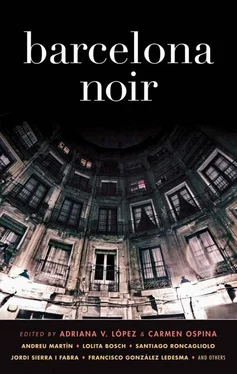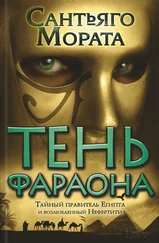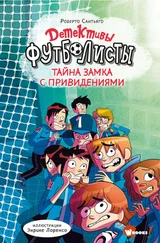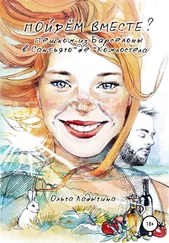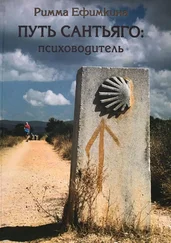Сантьяго Ронкальоло - Barcelona Noir
Здесь есть возможность читать онлайн «Сантьяго Ронкальоло - Barcelona Noir» весь текст электронной книги совершенно бесплатно (целиком полную версию без сокращений). В некоторых случаях можно слушать аудио, скачать через торрент в формате fb2 и присутствует краткое содержание. Город: New York, Год выпуска: 2011, ISBN: 2011, Издательство: Akashic Books, Жанр: Детектив, на английском языке. Описание произведения, (предисловие) а так же отзывы посетителей доступны на портале библиотеки ЛибКат.
- Название:Barcelona Noir
- Автор:
- Издательство:Akashic Books
- Жанр:
- Год:2011
- Город:New York
- ISBN:978-1-936070-95-4
- Рейтинг книги:5 / 5. Голосов: 1
-
Избранное:Добавить в избранное
- Отзывы:
-
Ваша оценка:
- 100
- 1
- 2
- 3
- 4
- 5
Barcelona Noir: краткое содержание, описание и аннотация
Предлагаем к чтению аннотацию, описание, краткое содержание или предисловие (зависит от того, что написал сам автор книги «Barcelona Noir»). Если вы не нашли необходимую информацию о книге — напишите в комментариях, мы постараемся отыскать её.
Barcelona Noir — читать онлайн бесплатно полную книгу (весь текст) целиком
Ниже представлен текст книги, разбитый по страницам. Система сохранения места последней прочитанной страницы, позволяет с удобством читать онлайн бесплатно книгу «Barcelona Noir», без необходимости каждый раз заново искать на чём Вы остановились. Поставьте закладку, и сможете в любой момент перейти на страницу, на которой закончили чтение.
Интервал:
Закладка:
It was a sad irony that Barcelona’s city jail, where there had been so many horrors, was called Modelo; it pretended to be a model prison and an example for the rest of the world.
They took him out to the street.
Two cops with Mausers.
At that time, because there were very few cars and very few drivers, it was common to transfer prisoners on foot, even across the city, even to the jail on Entenza Street. But it wasn’t very common to step out with the prisoners to busy Via Laietana, because it wasn’t the breeziest image to offer to their illustrious visitors; ordinarily, they’d leave the station from the back, where the narrow streets of the old city awaited them, Ciutat Vella, a dark labyrinth, dirty and empty.
The arrested man in front, the police behind.
And back then, the detainee would sometimes realize he was walking alone. He couldn’t hear the sound of the police boots at his heels.
And he’d stop and look back, all his vital signs on hold, and he’d see that the police were standing back at a certain distance, their Mausers at their hips.
And they’d say, “Go on. You can just go now.”
Brawner’s Shadows
by Antonia Cortijos
El Born
It’s been three days since I turned into his shadow. I sleep in the car so I won’t lose track of him. I sleep in fits and starts, always aware of the door to the building.
Around seven o’clock, he steps out on the street and I immediately get out of the car. I follow him from a few meters back so as not to arouse suspicion.
All these sleepless nights are starting to wear on me and I notice that I’m moving slowly. He’s getting too far ahead of me and I need to run to make up the distance. It looks like he’s in a hurry. It’s still dark out, though — they’ve just cleaned the streets and the water is getting in my shoes. My whole body shivers. I raise the collar of my coat and rub my hands to try to scare up some warmth.
He’s nearing the Passeig del Born and, like every day since I met him, he goes in a little tavern at the corner of Calders Street. It’s been open since six o’clock and a lot of the clientele are cab drivers finishing up the night shift and construction workers restoring houses in a neighborhood that’s being rehabilitated. They pick at the walls of the storefronts and homes until the stones show, and then the structure’s soul is exposed. You feel the vibration in your body and it tells the story of a neighborhood that was razed in 1714 by a vengeful king, who ordered the destruction of 1,200 homes so he could build his citadel, a military fort that dominated the city for more than a hundred years. Now, in its place, there’s Parc de la Ciutadella, beautiful, expansive, green.
I wait a few seconds and, protected by the darkness outside, stealthily approach to see how he reads the paper and drinks his coffee. All three days, he’s sat in the same place, away from the rest of the locals. I can’t take my eyes off him, and I continue to contemplate him, the same as yesterday and the day before — the way he addresses the waiter, the small gestures with his elbows barely separated from his body, the wait until the coffee reaches the desired temperature, the pleasure with which he drinks it all at once. He’s borrowed a newspaper that he holds near the coffee and, like every morning, I ask myself if it’s yesterday’s edition.
I breathe the salty fresh air with glee as light beckons dawn and profiles the silhouette of Mercat del Born, the old wholesale market, a modernist steel building that now stands empty and alone, with a sadness that comes from uselessness. It’s easy to get your bearings in this neighborhood, since every street and plaza still echoes with the noises and smells that distinguished each artisanal specialty. The streets are named after them.
When thirty minutes are almost up, I hide in one of the nearby alleys. I know he’ll cross my path at Sombrerers, a narrow street by the Church of Santa María del Mar; where there are now art galleries, wine shops, and restaurants, there used to be, from the Middle Ages until not too long ago, men’s millinery shops. Later we’ll go up Argenteria, where the smiths used to be, working silver, gold, and other precious metals. We’ll move along Via Laietana, the neighborhood’s southern border, until we arrive at the cathedral’s plaza. Then we’ll come to an ancient street, where a car can barely maneuver, and where there’s a bunch of antique shops. I know which one he’ll go in.
This is the time I use to get something to eat, and drink some coffee so the fog will lift from my brain.
Everything started about a week ago.
To me, it feels like an eternity.
The police came to my house to tell me, in a very frosty tone, that my mother had died.
They had found her body in the Botanical Garden at Parc de la Ciutadella, on a bed of white flowers, wearing a soft red silk robe which accented the pallor of her skin. The pose had been carefully constructed to make it seem as if she was enjoying a pleasant nap, and only her head, with abrasions on her neck and covered by a plastic bag, ruined the scene. The autopsy showed that Anna Brawner was already a corpse when she was deposited there, so an investigation was immediately initiated.
Inspector Gómez Triadó interrogated me twice but I couldn’t tell him very much. She’d always been a very strange woman who never gave me access to her secrets: I never knew where she was born; she always claimed to be a citizen of the world. The only time I ever got anything out of her was in my adolescence, when I found out that her mother had died during her birth. But she never told me who my father was, or if he was even still alive.
I had to take care of the body and had it transferred to a funeral home where I held a solitary wake. Seated in front of her, unable to take my eyes off her face, I felt a short circuit in my chest, leaving me in absolute darkness. The connection had corroded, and I know now with absolute certainty that I’d never be without that gloom.
The funeral was the next day. Inspector Gómez Triadó was there, along with two men and a woman I didn’t know.
One was an old man, surely more than ninety, who moved his very stately body with ease. That peculiarity, along with the high-collared, charcoal-colored, tailored suit that pretended to hide the ravages of age, and his immaculate and abundant white hair, gave him an aristocratic and seductive air.
The other man was in his forties, and he dressed and acted in a banal fashion.
The woman was the same age as my mother, but lacked her vitality, her love of life. Her gray eyes, covered in a haze, seemed to be asking for forgiveness.
Inspector Gómez Triadó hurried to take them in for questioning down at the station; it hadn’t even occurred to me that those people could reveal hidden parts of my mother that would help me understand her and myself. I simply accepted their condolences and continued to stare at the luxurious coffin in which she rested.
But something bothered me during the brief funeral. I felt a slight tingling on my neck just as the ceremony was about to end, as if someone’s gaze had been boring into me for a long time. An instinct made me turn my head, but I only glimpsed a shadow going out the door.
Nobody accompanied me to the small cemetery next to the funeral home, so I waited for them to finish preparing the grave and then I put the final touches on the burial rites by myself. I hadn’t been able to cry, but the minute the workers walked away, I gazed at the huge bouquet of flowers on the headstone and tears came in a rush, unstoppable; I had to kneel because my legs couldn’t hold the weight of my body, nor my pain.
When I opened my eyes, there was that shadow again. This time it vanished behind a white marble statue of a guardian angel. I don’t know which part of me reacted, because I was lost in a world of memories. I went to the cemetery exit and waited a few minutes before sneaking back to my mother’s grave. On the way, something made me detour toward the place where I thought the person who’d been watching me was hiding, as if breathing in the same air or walking on the same ground would connect me to him, would reveal his secret. I poked my head out, ever so slowly, from an extended wing, and then I saw him.
Читать дальшеИнтервал:
Закладка:
Похожие книги на «Barcelona Noir»
Представляем Вашему вниманию похожие книги на «Barcelona Noir» списком для выбора. Мы отобрали схожую по названию и смыслу литературу в надежде предоставить читателям больше вариантов отыскать новые, интересные, ещё непрочитанные произведения.
Обсуждение, отзывы о книге «Barcelona Noir» и просто собственные мнения читателей. Оставьте ваши комментарии, напишите, что Вы думаете о произведении, его смысле или главных героях. Укажите что конкретно понравилось, а что нет, и почему Вы так считаете.
